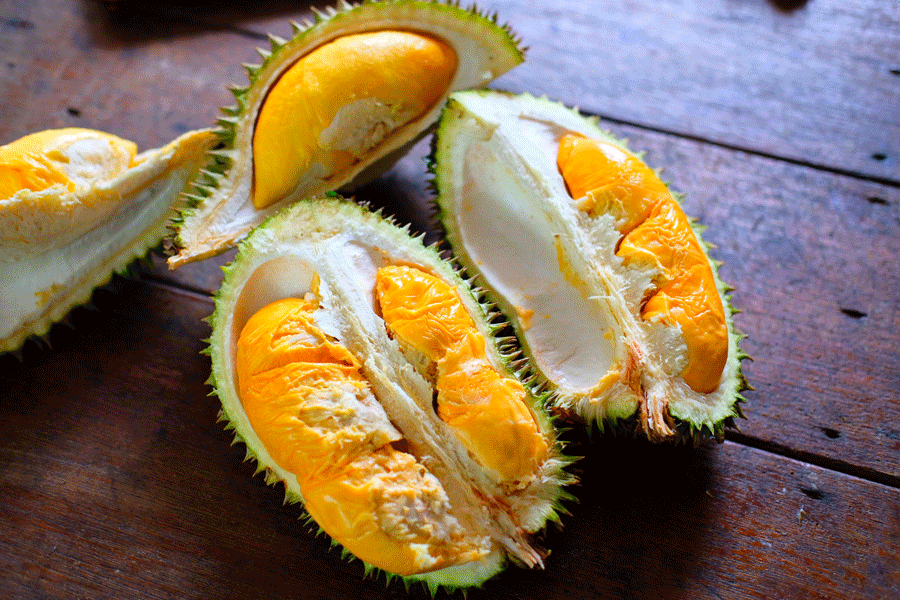Travelers making no stink over durian


The growth of the durian market in China has been largely due to booming e-commerce platforms. A total of 80,000 Golden Pillow durians from Thailand sold in just one minute on T-mall, Alibaba's business-to-consumer platform on April 17.
This came after Alibaba's Chairman Jack Ma signed four memorandums of understanding with the Thai government on trade, investment, e-commerce and tourism.
Alibaba is reportedly spending about $428 million in Thailand, the main durian exporter to China, as it aims to tap Chinese consumers' appetites for Thai agricultural produce.
Ma said China is on its way to becoming the world's largest consumer country, driven by rising incomes and a growing middle class of 300 million.
"There is no better time than now for trade-oriented countries to seize this opportunity to export to China as the country continues to open its doors wider for global trade," Ma said at the signing ceremony in Thailand.
The MOUs signed between Alibaba and the Thai government enable the e-commerce giant to import fresh durian directly from Thai farmers.
Liu Xiang, a senior operations specialist for T-mall's fruit and vegetable division, said this cooperation model saves time and money for consumers, as no middlemen are involved and journey time is shortened.
Zhang Can, a 42-year-old nurse living in Shanghai, said she bought five durians weighing between 5 and 10 kilograms in T-mall's online mega sale "Taste Thailand" in April, but thinks she did not buy enough, as the price was almost the same as that in Thailand.
She said she was satisfied with her purchases, as the price per kilogram was less than 30 yuan and the pulp tasted very fresh because it had been transported directly from Thailand.
Adisorn, the Thai minister-counselor, also said his government approved a strategic fruit development plan in February aimed at making Thailand a major trading nation in tropical fruit, and also approved a project to build a "fruit corridor" in the east of the country. The government has decided to start with durian, coconut and mangosteen, and China is one of its main target markets.
This lucrative market is also attracting Malaysia.
Bloomberg reported that a durian festival held by the Malaysian government in November in the southern Chinese city of Nanning, capital of the Guangxi Zhuang autonomous region, resulted in about 165,000 people clamoring for a taste of thawed samples of Musang King.
Ahmad Maslan, Malaysia's deputy minister for international trade and industry, said the Malaysian government is studying ways to export durians whole, as currently only frozen durian pulp, durian fruit with seeds, and other byproducts such as cookies, are exported to China.
He said it is easier for Thai durians, rather than those from Malaysia, to be exported to China because Thai farmers pick durian when the fruit is still on the tree.
"Malaysian durian farmers normally wait for the fruit to ripen and drop to the ground rather than climb the tree to collect it, so the risk of dirt and pests on the whole fruit is deterring many countries from accepting Malaysian durian," he said.
Maslan added that negotiations with China are underway and may lead to approval for whole-fruit exports within a year.
The ministry is also working with farmers on the use of nets and ropes to harvest the fruit before it hits the ground, he said.
China imported 4.4 million metric tons of fresh fruit last year valued at $5.59 billion. Thailand ranked the top exporter by value of fresh fruit to the country, with Chinese imports reaching $1.2 billion,-21 percent of the total import value.
Thailand is also the world's leading exporter of fresh durians. The country's annual durian production leveled off at about 600,000 tons last year, according to the Thai Customs Department. Of this, 500,000 tons was exported to China.
With Malaysia's 45,500 durian farmers excluded from the Chinese market for whole, fresh durians, prices for Malaysian durian products are relatively high.
Prices of Musang King durians are five to six times higher than those for Golden Pillow produce from Thailand. At Beijing's Sanyuanli market, a frozen 5 kg Musang King durian can cost as much as 1,200 yuan.























